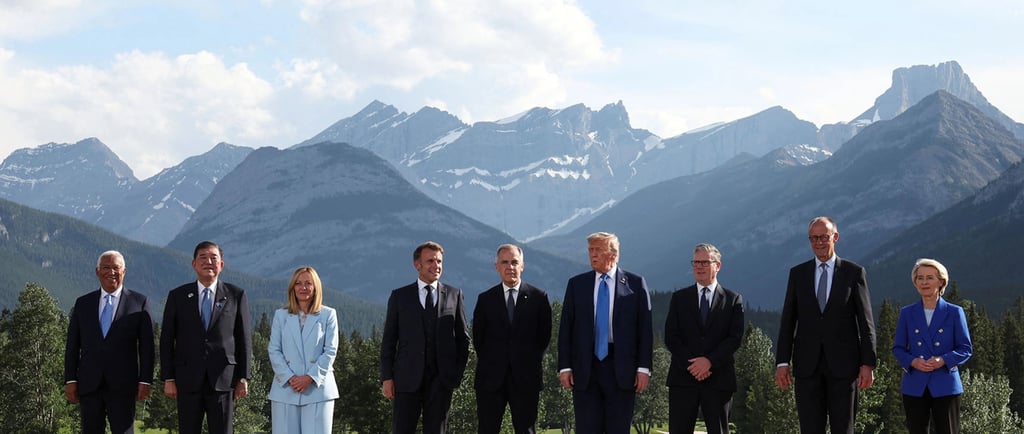Two Approaches to Global Economic Governance: The G7 and G20
Global economic crises spurred the creation of the G7 and G20, which have since been central to coordinating policy and stabilizing the international financial system. However, which forum, the narrow G7 or the broad G20, will prove more effective in addressing future global challenges, as their effectiveness is increasingly questioned?
GLOBAL
Nurila Nursalimova
8/1/20253 min read


G7 and G20 are global intergovernmental economic forums that unite the world’s leading economies to discuss global challenges and coordinate political agendas.
The G7 (Group of Seven) was formed on 15 November 1975 during a time of economic turmoil following the oil crisis. This initiative began as a meeting of six of the world's largest economies, the United States of America, the United Kingdom, France, Germany, Italy, and Japan, with Canada joining a year later, to discuss possible solutions for this growing problem.
These countries remain among the richest and most politically influential in the world, accounting for 62% of global net wealth and approximately 45% of the world’s GDP, despite representing only 10% of the globe's population. A major contributor to this economic weight is the United States, with a population of 329 million out of the G7’s total 770 million. Furthermore, five G7 members are ranked among the top ten countries with the largest gold reserves. Accordingly, the G7 enormously contributed to the world’s global financial stability.
In 1997, the G7 provided 300 million USD to the efforts to contain the reactor meltdown in Chernobyl. In 1999, the G7 cooperated in the establishment of both the financial stability forums, a group consisting of major national financial authorities, such as Central Banks, Finance Ministries, and the G20. The G7 has also created the Debt Reduction Initiative, launched in 1996 for 42 heavily indebted poor countries, which comprises many nations located in Sub-Saharan Africa, the Americas, and Asia. This initiative has seen more than 90% of bilateral and multilateral debt cancelled, totaling over 100 million USD.
On the other hand, the G20 (Group of Twenty) was established on 26 September 1999 in response to the Asian Financial Crisis that started in Thailand and spread across East Asia, threatening many other Western countries. Unlike the G7, the G20 includes a much wider range of economies. Its members represent 85% of global GDP, 75% of international trade, and two-thirds of the world’s population. Countries like India, China, Brazil, South Africa, Saudi Arabia, and Argentina also have a voice here, alongside G7 members. The European Union is also an official member of this initiative.
In 2008, a major financial crisis emerged once again. To get the crisis under control, heads of governments were brought around the table, moving the G20 into the upper echelons of politics. Together, they agreed on important financial reforms to deal with the crisis. Today, the summit takes place once or twice a year. Leaders of countries, their representatives, and various specialist ministers are now joined at the table by institutions, such as the World Health Organisation (WHO), and the final decision on which guests are allowed to attend and the content of the summit falls to the President organising the event. These steps are taken to fight and prevent global crises, which is the G20’s mission. The G20 has already achieved some of its goals: tougher measures have been adopted to safeguard taxpayers from financial charges, poorer countries have been financially supported, and they agreed to keep global warming below two degrees Celsius.
Nowadays, the G20 is embracing a more inclusive model of global governance, especially under the recent and upcoming presidencies: India’s 2023 presidency prioritized the Global South; Brazil (2024-2025) is emphasizing sustainable development and reform of international financial institutions; lastly, South Africa (2025) is expected to overpower African agency, global health equity, and climate change.
Both the G7 and G20 have agreed in recent years to push for reforms of the World Bank and IMF to better serve developing countries, increase access to Special Drawing Rights (SDRs) for lower-income nations, and better debt relief frameworks for heavily indebted poor countries. Moreover, these two forums stand for stronger Artificial Intelligence, climate, and financial developments.
In global economic governance, it is highly essential to work cooperatively. The G7 brings historical influence, but its reach is limited. The G20 brings diversity but often struggles with unity. When the collaboration between these two groups is effective and fruitful, the world will move toward the most sustainable global economic systems.


